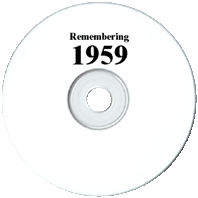

From the Red Scare to the Space Race, Alaska and Hawaii entered the Union and music died when Buddy Holly, Ritchie Valens, and The Big Bopper died in a fatal airplane crash.

44 old time radio show recordings
(total playtime 13 hours, 31 min)
available in the following formats:
1 MP3 CD
or
15 Audio CDs
Text on OTRCAT.com ©2001-2026 OTRCAT INC All Rights Reserved. Reproduction is prohibited.

Although America seemed to be making technological advances against the Communist Menace, that Menace was setting up housekeeping in our own backyard was Fidel Castro came to power in Cuba, just 90 miles off the tip of Florida. Soon after Castro entered Havana in January, he was visited by "Mr. Sunday Night", Ed Sullivan. During the interview, Sullivan treated Castro as a scrappy revolutionary and asked him about his background as an athlete. There is an urban legend that Major League Baseball scouts had looked at Castro, and that the Cuban Revolution may have been put aside for a baseball career, but this is a myth. As Castro's hold on Cuba solidified and he built ties with the Soviets, fears of a Communist stronghold in the Western Hemisphere became a subject for discussion on Meet the Press.

Domestically, perhaps the biggest news was the entry of Alaska and Hawaii as the 49th and 50th States of the Union, although not part of the contiguous States, both had high strategic importance. The music world was shocked when a chartered airplane carrying Buddy Holly, Ritchie Valens, and The Big Bopper crashed during foggy conditions in Iowa, "the day the music died" would later be memorialized in the song "American Pie" (1971) by Don McLean.
By this time, television had established itself as the dominant media as color broadcasts became more common and the price of color sets began to come down. Not quite dead, network radio produced some of the greatest episodes of its best programs, including Suspense, Gunsmoke, The Grand Ol' Opry, Have Gun-Will Travel, You Bet Your Life, and Yours Truly Johnny Dollar. Since becoming one of radio's most popular characters in 1935, Fibber McGee and Molly finally went off the air in 1959 due to Marian Jordan's health concerns (she would lose her battle with ovarian cancer on April 7, 1961). NBC attempted to bring Fibber McGee and Molly to the small screen in the 1959 season with younger actors (only Harold Peary playing Mayor LaTrivia instead of Gildersleeve came from the radio days) but the program was not well received and canceled during its first season.

Text on OTRCAT.com ©2001-2026 OTRCAT INC All Rights Reserved. Reproduction is prohibited.
You have reached the maximum number of votes for a unregistered user.
Please login or create a new account to continue...
You have reached the maximum number to down votes in this page.



1959 Disc A001
|
Add Audio CD to Cart - $5.00 |
1959 Disc A002
|
Add Audio CD to Cart - $5.00 |
1959 Disc A003
|
Add Audio CD to Cart - $5.00 |
1959 Disc A004
|
Add Audio CD to Cart - $5.00 |
1959 Disc A005
|
Add Audio CD to Cart - $5.00 |
1959 Disc A006
|
Add Audio CD to Cart - $5.00 |
1959 Disc A007
|
Add Audio CD to Cart - $5.00 |
1959 Disc A008
|
Add Audio CD to Cart - $5.00 |
1959 Disc A009
|
Add Audio CD to Cart - $5.00 |
1959 Disc A010
|
Add Audio CD to Cart - $5.00 |
1959 Disc A011
|
Add Audio CD to Cart - $5.00 |
1959 Disc A012
|
Add Audio CD to Cart - $5.00 |
1959 Disc A013
|
Add Audio CD to Cart - $5.00 |
1959 Disc A014
|
Add Audio CD to Cart - $5.00 |
1959 Disc A015
|
Add Audio CD to Cart - $5.00 |
Please wait...
COMMENTS
Be the first to comment on "1959"
Leave a comment